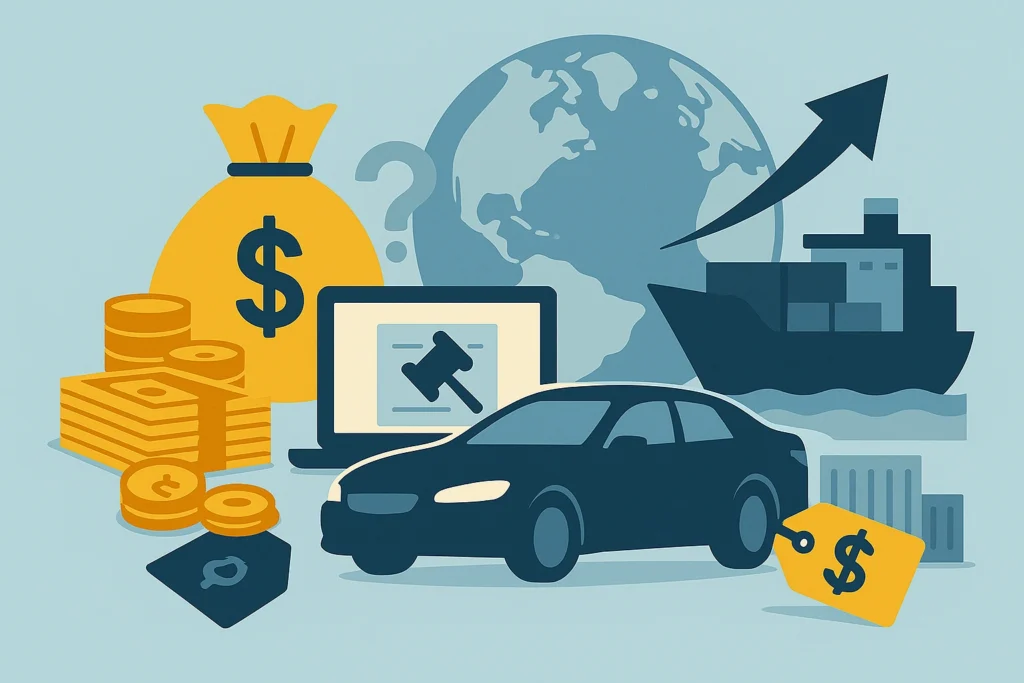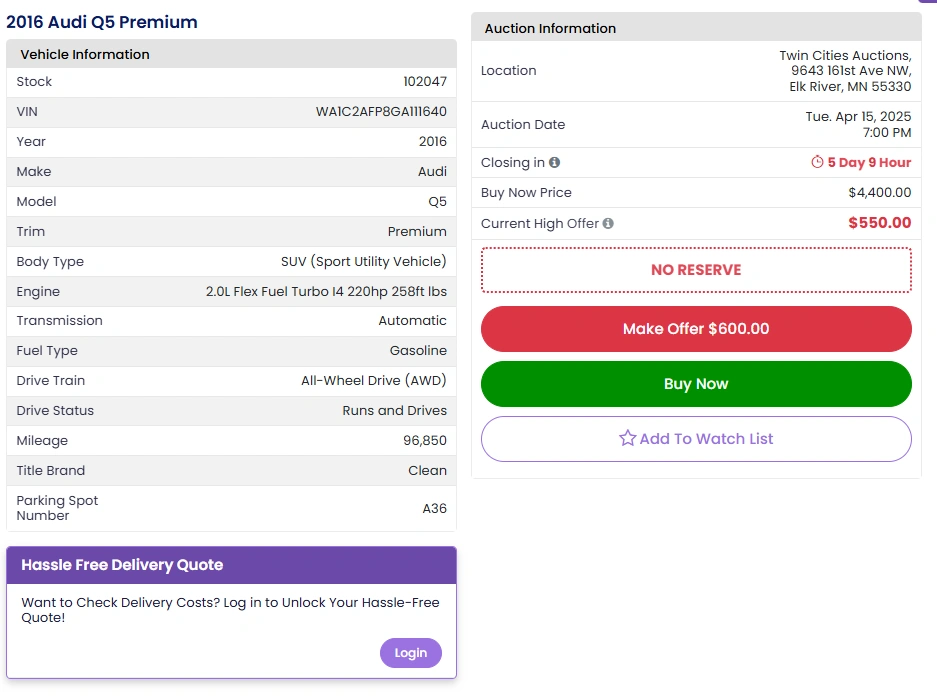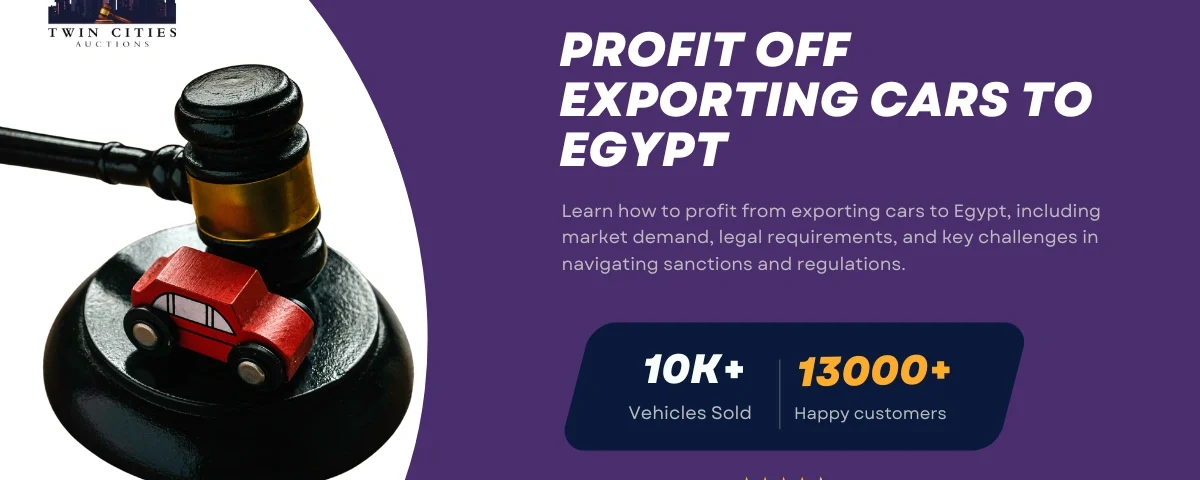Egypt’s auto imports surged to nearly 50 000 vehicles in 2023, creating a $350 million market that’s still wide open to U.S. exporters.
By following this guide, you’ll learn exactly how to secure compliance with Egypt’s regulations, calculate your total costs down to the last dollar, and streamline shipping through Alexandria and Port Said to capture up to an 18 percent profit margin in just six months. Let’s get started.

Key Takeaways
- Market Size & Growth: Egypt’s vehicle import market reached approximately 45,000–50,000 units in 2023, valued at $300–$350 million, with an estimated annual growth rate of 7%.
- Import Regulations: Imported vehicles must be no older than ten years and require both an import permit from the Ministry of Trade and a certificate of conformity verifying compliance with safety and emissions standards.
- Shipping Logistics: Major entry points for vehicle imports are the ports of Alexandria and Port Said, with transit times from the U.S. East Coast averaging 18–22 days according to OneLogix Cargo Solutions
- Payment Methods: Letters of Credit (LCs) are mandated for import transactions to ensure payment security and regulate foreign currency usage.
- Profit Potential: By accurately calculating landed costs and adhering to regulations, importers can achieve profit margins up to 18% within six months.
Understanding the Egyptian Market
Total vehicle imports (all types) are estimated at 45 000–50 000 units, valued at 300–350 million USD in 2023. Urban buyers in Cairo favor compact sedans and SUVs for fuel efficiency, while government and fleet purchasers in Alexandria and Giza opt for diesel pickups and light trucks.
| Metric | Figure |
| Vehicles Imported | 45 000–50 000 units |
| Estimated Market Value | 300–350 million USD |
| Year‑over‑Year Growth | Approximately 7 percent |
Source: Central Agency for Public Mobilization and Statistics
Regulations and Compliance
Egypt enforces a strict ten-year maximum age limit on imported vehicles to ensure environmental and safety standards. All vehicle imports require a certificate of conformity from an accredited testing center, verifying compliance with Egyptian regulations.
Additionally, importers must obtain an import permit from the Ministry of Trade and Industry before proceeding with the importation process. These measures aim to regulate the quality and environmental impact of vehicles entering the Egyptian market.
| Document | Purpose | Required For |
| Commercial Invoice | Declares sale value | All imports |
| Bill of Lading | Proof of maritime shipment | Sea‑borne imports |
| Import Permit | Government authorization | All vehicle imports |
| Certificate of Conformity | Verifies safety and emissions compliance | All imports |
Source: Egypt Customs Authority
Building Your Landed Cost and Profit Model
Accurate cost modeling is crucial for profitability in vehicle importation. The total landed cost includes the Cost, Insurance, and Freight (CIF) value, import duties, Value Added Tax (VAT), and miscellaneous fees.
For example, a vehicle with a CIF value of $10,000 would incur a 25% import duty ($2,500), a 14% VAT on the sum of CIF and duty ($1,750), and miscellaneous fees estimated at 3% of CIF ($300), totaling a landed cost of $14,550.
Importers should then add their target profit margin, such as 20%, to this total to determine the final selling price.
| Cost Item | Rate | Calculation Example (USD) |
| CIF Cost | — | 10 000 |
| Import Duty | 25 percent | 2 500 |
| Value Added Tax | 14 percent | (10 000 + 2 500) × 0.14 = 1 750 |
| Miscellaneous Fees | 3 percent | 10 000 × 0.03 = 300 |
| Total Landed | — | 14 550 |
Source: Egypt Customs Authority
Add your target profit margin (e.g., 20 percent) above the landed cost.
Logistics and Shipping Routes
Shipping vehicles to Egypt typically involves sea freight to major ports like Alexandria and Port Said. Transit times vary based on the origin; for example, shipping from the U.S. East Coast to Alexandria takes approximately 17 days.
| Route | Transit Time | Notes |
| U.S. East Coast → Alexandria | 18–22 days | Mediterranean crossing |
| U.S. Gulf Coast → Port Said | 16–20 days | Breakbulk options available |
| U.S. West Coast → Alexandria | 25–30 days | Longer sea route through Suez Canal |
Source: Maersk
Financing and Payment Security
Egypt mandates the use of Letters of Credit (LCs) for import transactions, ensuring payment security for exporters. This requirement aims to regulate foreign currency usage and streamline import processes.
Select terms to balance risk and cash flow:
| Method | Risk Level | Best Use |
| Letter of Credit | Low | New partners; large shipments |
| Open Account | High | Established, trusted buyers |
| Escrow | Medium | Ensures delivery before payment release |
Source: U.S. Export‑Import Bank
Mitigate USD/EGP fluctuations with forward contracts at major Egyptian banks.
Common Pitfalls to Avoid
- Underestimating combined duty and VAT erodes margins
- Missing import permit or certificate of conformity delays clearance
- Overlooking age‑limit enforcement leads to rejections
Use the Egyptian Customs pre‑shipment checklist to confirm documentation.
Source: Egypt Customs Authority
Why Auctions Are a Smart Choice for Car Purchases
Auctions can be an excellent source for late-model vehicles with clear chains of title and affordable pricing. Twin Cities Auctions, based in Minnesota, is one such reputable auction house that offers a wide range of vehicles at competitive prices.
Key Benefits of Buying from Auctions:
- Wide Selection: Auctions like Twin Cities Auctions offer a variety of vehicles, from low-budget cars to high-end models.

- Competitive Pricing: Auctions often offer vehicles at prices below retail value, enabling dealers to maximize their profit margins.

- Transparency: Auctions provide full vehicle history reports, so you know exactly what you’re buying.

- Convenient Bidding: Many auctions offer online bidding for your convenience, making it easier to source vehicles without being physically present.
Twin Cities Auctions: A Smart Vehicle Sourcing Choice
For those in the automotive industry, Twin Cities Auctions offers an excellent platform for sourcing quality vehicles at competitive prices.
Whether you are just starting or expanding your business, this auction house provides transparency, competitive pricing, and a broad selection.
| Feature | Description |
| Inventory Variety | Wide range of cars, trucks, and SUVs available |
| Competitive Pricing | Below-market pricing allows for higher profit margins |
| Vehicle History Reports | Detailed history reports for every vehicle |
| Online Bidding | Convenient online bidding options for dealers |
| Financing Options | Financing available to help with inventory purchases |
Conclusion
By mastering Egypt’s ten-year age limit, securing both the import permit and certificate of conformity, and building a precise landed-cost model that layers in the 25 percent duty, 14 percent VAT, and handling fees, you’ll safeguard your margins and avoid costly holdups.
Routing shipments through Alexandria or Port Said, pairing disciplined compliance with sound financing (letters of credit or forward contracts), and sourcing late-model vehicles from U S. auto auctions like Twin Cities Auctions will streamline your operations
. Follow this guide closely to turn Egypt’s 45 000–50 000-unit demand into reliable, profitable growth—capturing up to an 18 percent return on investment within six months.
Public Auctions Made Easy with Twin Cities Auctions
At Twin Cities Auctions, we strive to simplify the public auction process for everyone. You don’t need a dealer license to buy or sell cars here. Our online auctions are designed to be user-friendly and open to the public, ensuring that individuals of all experience levels—from novice buyers to experienced sellers—can participate with ease.
With a focus on transparency and ease of use, we provide all the tools and support you need to confidently participate in the auction process. Start your car buying or selling journey with us today and experience how straightforward and effective our auction system can be!
Looking for more options? Explore our comprehensive list of all available car auctions across the United States. Your next deal might be just a click away!
FAQ
What are Egypt’s auto import duties?
Import duty is 25 percent of CIF value plus VAT of 14 percent.
Can I export used cars to Egypt?
Yes—vehicles must be no older than ten years and hold a certificate of conformity.
What age restrictions apply?
Imports must be manufactured within the last ten years.
How long does customs clearance take?
Typically five to seven business days with complete documentation.
Are emissions tests mandatory?
Yes—certificate of conformity must verify compliance with national emissions standards


